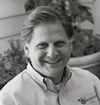Mads Troels Hansen had a some challenging questions for me in this hangout, such as...…
6 Simple Questions for Alan Shalloway
About one year ago I published a series of interviews called "5 Easy Questions". The answers to those questions came from Steve McConnell, Johanna Rothman, Alistair Cockburn, Robert L. Glass, Scott Berkun and many other celebrities.
Well, almost a year has gone by, and I thought "That was great. Let's do that again!" But this time with different people, and different questions…
Alan Shalloway is the primary author of Lean-Agile Software Development: Achieving Enterprise Agility, The Lean-Agile Pocket Guide for Scrum Teams, Design Patterns Explained: A New Perspective on Object-Oriented Design and is currently writing Essential Skills for the Agile Developer. He is CEO of Net Objectives, a provider of Lean-Agile consulting, training and assessment services. You can read Alan’s blog or get more information at Net Objectives resources page.
These are the five questions I asked Alan, and the answers that he gave me…
1. What has been the most effective motivator for you to do your best work ever?
The fact that I am clear that my life’s work is about helping people. It turns out that I know more about software development and how people should do it, so that’s where I concentrate my efforts on serving others. By combining my skills in how to do software along with my understanding of how people interact with the world, I am fairly effective in transitioning organizations to better methods. Helping people be more effective in their work helps them in their life.
2. What work has been the most difficult for you to delegate to others?
 Anything that relates to my own survival or goals has been difficult for me. Of course, this has been most of the work around me. But I’ve known for a long time that this is something I’ve had to do. Fortunately, my experience with lean methods has helped me greatly here. I understand now that I can delegate while still observing how people are doing. This enables me to coach them if things go bad without jumping in and trying to fix things. It’s still tough – but I can now manage the fears associated with this.
Anything that relates to my own survival or goals has been difficult for me. Of course, this has been most of the work around me. But I’ve known for a long time that this is something I’ve had to do. Fortunately, my experience with lean methods has helped me greatly here. I understand now that I can delegate while still observing how people are doing. This enables me to coach them if things go bad without jumping in and trying to fix things. It’s still tough – but I can now manage the fears associated with this.
3. How would you define the purpose or goal of your work?
My purpose, and therefore the purpose of my company, Net Objectives, is to enable people to develop software effectively and without suffering. This means helping them achieve mindsets that are helpful in this as well as providing them tools and knowledge that will further what they are up to.
4. How have you tried to achieve excellence in the work you do?
I am always about learning and being true to my own values. I am far from perfect, but when I interact with people in a way that does not meet the vision of myself, I see how I can learn to do better in the future. I am always looking to see what would be useful to know. I look to others that I consider effective and see what they have to offer me. I like to remember Voltaire’s saying – “Doubt is uncomfortable, certainty is ridiculous.” This reminds me that I often have to live in a space of not knowing. I have to use my commitment to serve others as a way to overcome my own fears of being out of control when I don’t know.
5. Of which one of your failures are you most proud?
I wouldn’t say I am proud of any failure. However, I am proud of how I have reacted to several failures. As Zig Ziglar says – “failure is an event, not a person.” I had a failed partnership that enabled me to see that I was not being true to my own values that family comes before business. I am not proud that the business went the way it did, but I am proud that I learned from that experience.
6. And which of your successes was completely undeserved?
In many ways all of my successes are undeserved because I could not have achieved them without others. Therefore, they are not _my_ successes at all. However, I believe that my recent successes result mostly from my commitment to others. This enables me to connect better to others. Most of the success of Net Objectives is due to others in the company. I provide the vision – that is worth a lot. But it would be of little value without others.
Well, these are the answers given by Alan. I hope you liked them.
Next week: the same questions, but different answers, from Lisa Crispin!
 Twitter –
Twitter –  Subscribe –
Subscribe –  Newsletter –
Newsletter –  Bookmarks
Bookmarks
| Latest, greatest and favoritest posts: 5 Easy Questions for Ron Jeffries 5 Easy Questions for Mike Cohn 5 Easy Questions for Scott Rosenberg |




